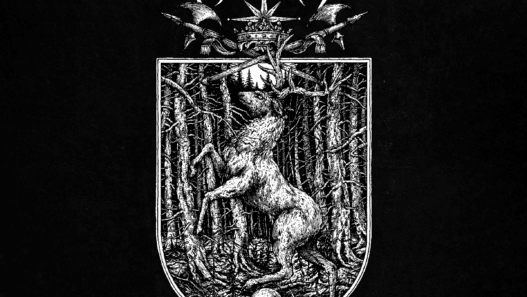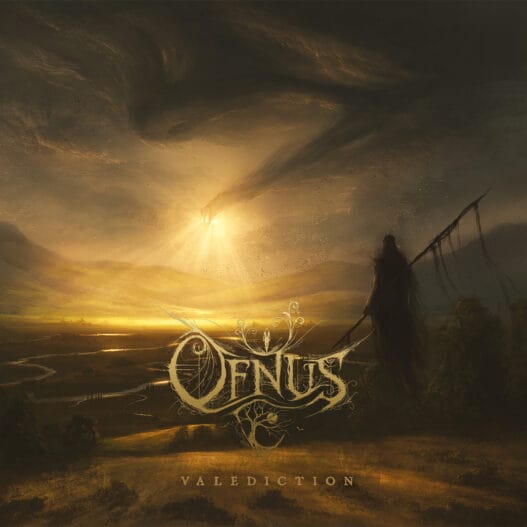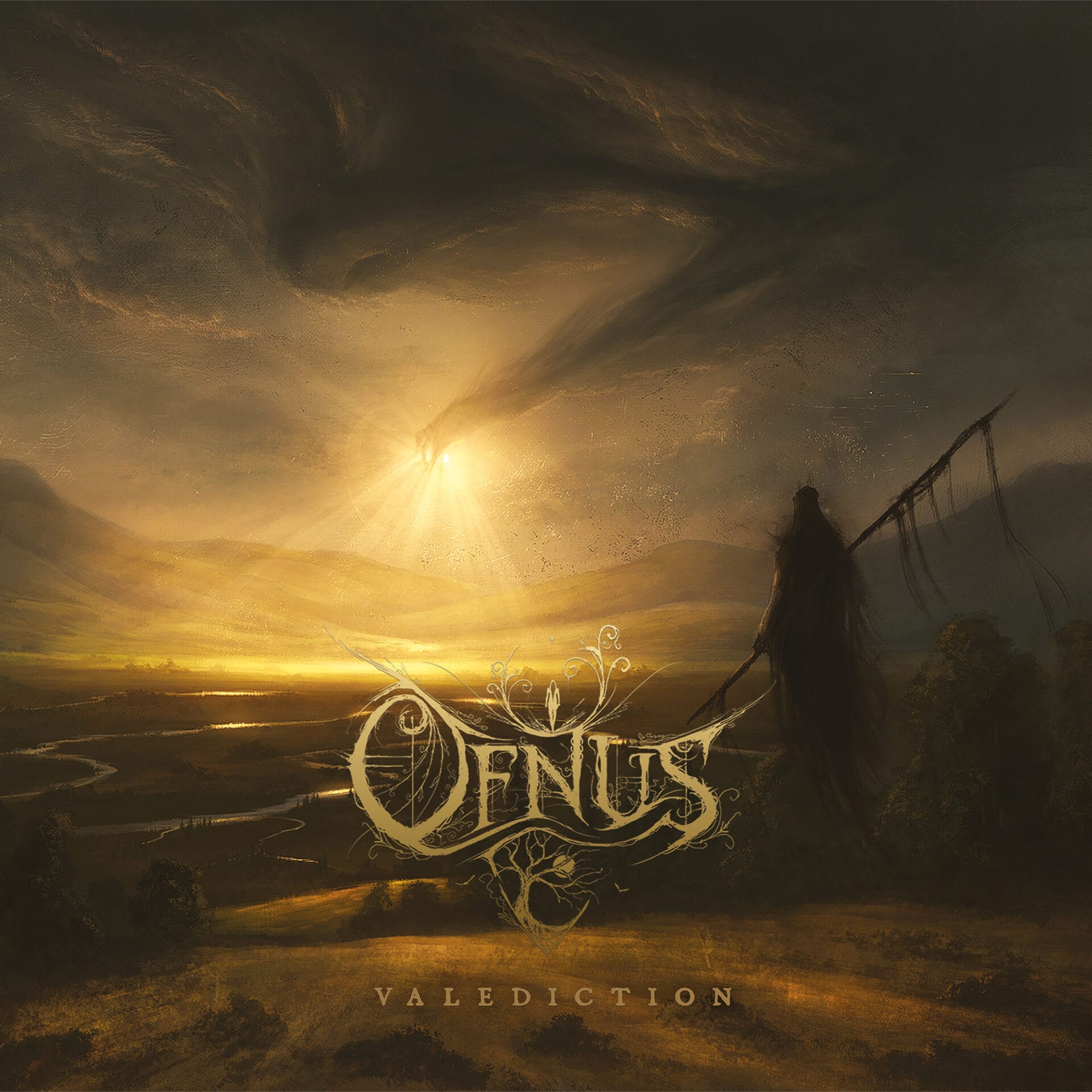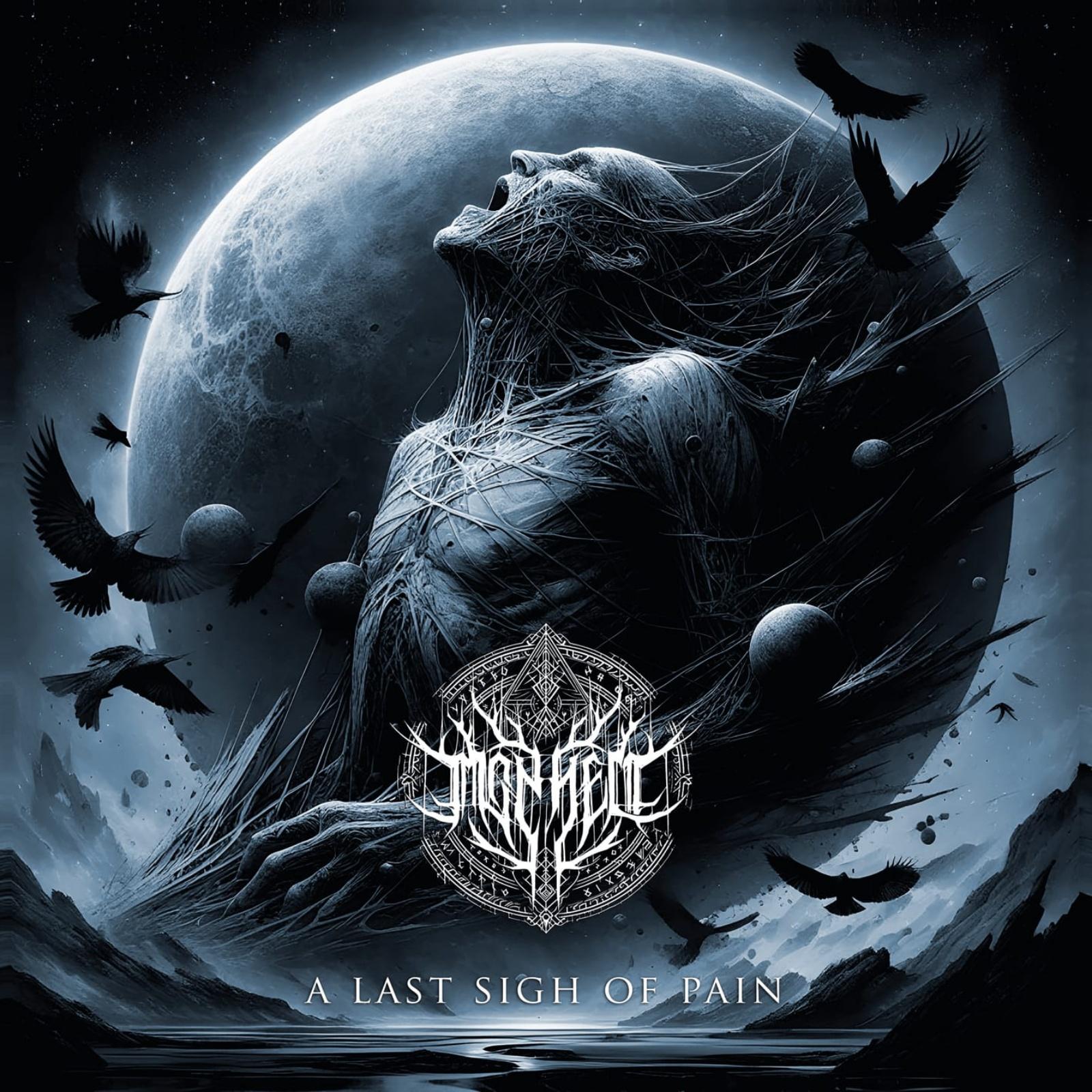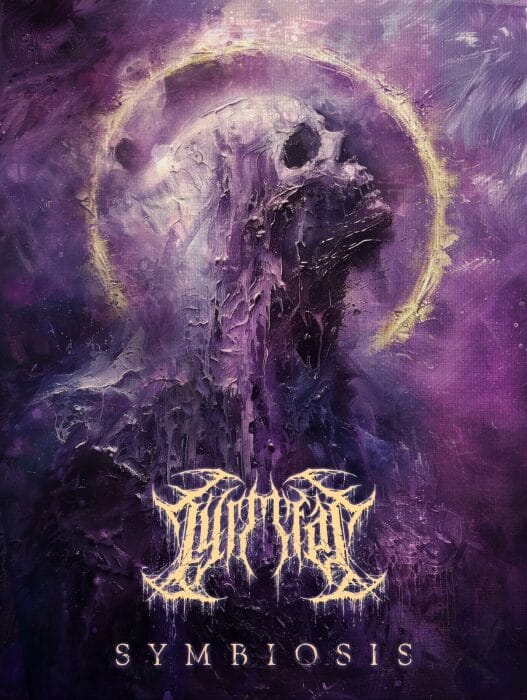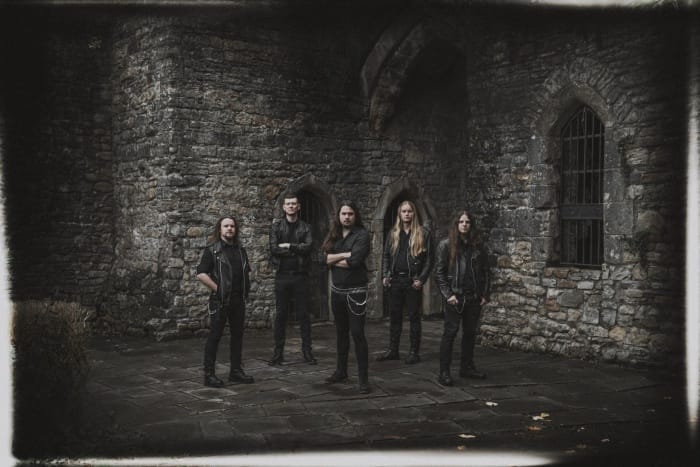
(English Below)
Tras el celebrado debut «Time Held Me Grey And Dying», los galeses Ofnus regresan con «Valediction», una obra que se sumerge en las múltiples capas del duelo, transformando la experiencia emocional más devastadora en una epopeya de black metal atmosférico de alto calibre. Desde los primeros compases de “The Shattering” hasta el oscuro y opresivo final con “Alazia”, la banda despliega una narrativa musical que no solo documenta el proceso del dolor, sino que lo encarna en toda su crudeza, belleza y complejidad.
«Valediction» no es simplemente un álbum, sino un viaje introspectivo hacia las profundidades del sufrimiento humano. Cada una de las siete composiciones representa una fase del duelo, y lo hace no solo a través de sus letras, sino con una arquitectura sonora coherente, rica y envolvente. La crudeza inicial, la negación, la ira, la introspección melancólica y la eventual (y no garantizada) aceptación están meticulosamente representadas con una maestría compositiva que trasciende etiquetas.
El álbum abre con “The Shattering”, una declaración de intenciones que arranca con blast beats frenéticos y riffs filosos como una herida recién abierta. La voz de William Philpot, agónica y rasgada, parece brotar desde lo más hondo del trauma. Su interpretación —aguda, dolorosa, honesta— es una de las mayores virtudes del disco.
La producción corre nuevamente a cargo de Philpot y Abraham Fihema, quienes ya demostraron su talento en el primer disco de la banda. Aquí consiguen una mezcla impecable, equilibrando agresividad y atmósfera. Es cierto que la batería puede parecer algo “fría” en algunos pasajes, pero este tratamiento gélido refuerza la sensación emocional de aislamiento, lo que parece intencional.
Musicalmente, el dúo de guitarristas Ponsford y Hunter brilla por su inventiva melódica. Lejos de caer en el cliché, logran un balance notable entre riffs épicos, disonancias angustiosas y melodías que parecen lágrimas cristalizadas. Hay algo profundamente narrativo en su forma de escribir: cada nota parece parte de una confesión.
En “Reflections Of Delusion”, la banda se interna en un terreno más introspectivo y cinematográfico. Aquí, el duelo se muestra en su etapa más frágil: la confusión, la negación que no grita, sino que se repliega. Con una estructura progresiva que rehúye la repetición, la canción se construye como un diálogo interno entre la resignación y la esperanza. No hay aquí un “interludio bonito”, sino una rendija por la cual la vulnerabilidad se cuela sin permiso. Las guitarras —capas sobre capas de dolor melódico— no acompañan, sino que conducen. Es la aceptación de que algo se ha roto… pero aún no se sabe qué.
Si hay una canción que encapsula la imprevisibilidad del duelo, es “Proteus”. Su título, extraído del dios griego de las transformaciones marinas, no podría ser más adecuado. El tema es un cuerpo en constante mutación: agresivo, etéreo, melódico, violento. Comienza como un alud, se detiene en un páramo de armonías, y vuelve a lanzarse como un lobo herido. El ritmo cambia abruptamente, casi sin lógica aparente, pero nunca de forma arbitraria. Hay aquí un caos coreografiado, como si cada giro emocional estuviera ensayado para herir. El trance aparece no como una fuga, sino como una forma de adaptación: cuando ya no puedes procesar más dolor, simplemente te abandonas al oleaje. Ofnus logra una composición tan imprevisible como orgánica, que convierte a «Proteus» en el epicentro emocional y técnico del disco.
“Zenith Dolour” representa la caída sin red. No hay ímpetu aquí, ni siquiera rabia: solo una tristeza que pesa como una losa. Ofnus arrastra al oyente a los confines más profundos del dolor con una ejecución medida, lenta, envolvente. Las guitarras tejen una telaraña de líneas melódicas que no guían, sino que atrapan. Las cuerdas —fúnebres, arrastradas— cortan como bisturís emocionales, diseccionando cada vestigio de esperanza. La voz de Philpot se transforma en un eco de ultratumba, menos grito y más lamento. Hay algo ritual en esta canción, como si el grupo hubiera querido encapsular el silencio que viene después del llanto. Es la muerte emocional de lo que alguna vez fuimos.
En su tema homónimo, Ofnus ofrece la única luz —aunque tenue y lejana— del álbum. “Valediction” es aceptación, pero no reconciliación. Su estructura se abre como un amanecer entre ruinas: hay belleza, sí, pero es la belleza de lo irreparable. La melodía aquí no hiere, sino que consuela; las guitarras no cortan, sino que sostienen. Cada nota está medida, cada ritmo contiene un significado más allá de la forma. Es el cierre de una carta no enviada, el suspiro antes de cerrar la puerta. Musicalmente, es el punto más equilibrado del disco: ni grandilocuente ni minimalista, simplemente justo. Como si después de tanta oscuridad, el silencio ya no diera miedo.
Pero si “Valediction” ofrecía una posible salida, “Alazia” se encarga de cerrar esa puerta de golpe. Aquí no hay aceptación ni redención, solo condena. Esta canción es una antítesis: de lo humano, de la sanación, de la esperanza. La atmósfera se densifica hasta lo irrespirable, y las progresiones armónicas descienden como un espiral sin fin. La batería, más tribal que técnica, marca el pulso de una procesión hacia la nada. El riff principal es una soga emocional que se tensa sin romperse. Este cierre —oscuro, seco, terminal— es una advertencia: no todos salen del duelo. Algunos simplemente… se quedan.
Lo que separa a Ofnus de otras bandas del género es su sinceridad emocional y la capacidad de esculpir paisajes sonoros que no solo acompañan la narrativa lírica, sino que la expanden. La influencia de bandas como Winterfylleth o Agalloch es perceptible, pero Ofnus imprime su propia voz, en parte gracias al contraste entre voces feroces y limpias —estas últimas más humanas, más cálidas— y a las estructuras de canciones que, si bien largas, están lejos de ser monótonas.
En «Valediction», Ofnus ha logrado no solo una evolución, sino una cristalización de su propuesta. Este segundo álbum es más ambicioso, más arriesgado y, sobre todo, más emocionalmente devastador que su predecesor. Es una obra que exige ser escuchada con atención y entrega. No está hecha para acompañar tareas diarias ni para sonar de fondo. Está hecha para mirar al abismo, para descender con dignidad al dolor y, quizá, volver.
Un álbum que posiciona a Ofnus no solo como una de las bandas más prometedoras del black metal atmosférico europeo, sino como artistas completos capaces de trazar el mapa sonoro del alma rota.
Puntuación: 9.3 / 10: Una obra maestra emocionalmente compleja, técnicamente refinada y devastadoramente bella.
Track list de «Valediction» :
- The Shattering
- Reflections Of Delusion
- Throes Of Agony
- Proteus
- Zenith Dolour
- Valediction
- Alazia
Miembros
Richard Rees – Bajo
Ethan Reed Spargo – Bateria
James Ponsford – Guitarra
William Philpot – Voz
Alyn Hunter – Guitarra
Redes sociales
Facebook: https://www.facebook.com/Ofnus
After the acclaimed debut «Time Held Me Grey And Dying», the Welsh band Ofnus return with «Valediction», a work that dives into the multiple layers of grief, transforming the most devastating emotional experience into a high-caliber atmospheric black metal epic. From the first bars of “The Shattering” to the dark and oppressive ending with “Alazia”, the band unfolds a musical narrative that not only documents the process of pain, but embodies it in all its rawness, beauty, and complexity.
«Valediction» is not simply an album, but an introspective journey into the depths of human suffering. Each of the seven compositions represents a phase of grief, and does so not only through its lyrics, but with a coherent, rich, and immersive sonic architecture. The initial rawness, denial, anger, melancholic introspection, and the eventual (and not guaranteed) acceptance are meticulously represented with a compositional mastery that transcends labels.
The album opens with “The Shattering”, a statement of intent that begins with frenetic blast beats and riffs as sharp as a freshly opened wound. William Philpot’s voice, agonizing and torn, seems to emerge from the depths of trauma. His performance — sharp, painful, honest — is one of the album’s greatest virtues.
The production is once again handled by Philpot and Abraham Fihema, who already demonstrated their talent on the band’s first record. Here they achieve an impeccable mix, balancing aggression and atmosphere. It is true that the drums may seem somewhat “cold” in some passages, but this icy treatment reinforces the emotional sense of isolation, which seems intentional.
Musically, the guitar duo Ponsford and Hunter shines for its melodic inventiveness. Far from falling into cliché, they achieve a remarkable balance between epic riffs, distressing dissonances, and melodies that resemble crystallized tears. There is something deeply narrative in their writing style: each note seems like part of a confession.
In “Reflections Of Delusion”, the band enters a more introspective and cinematic terrain. Here, grief is shown in its most fragile stage: confusion, denial that does not scream, but retreats. With a progressive structure that avoids repetition, the song is built like an internal dialogue between resignation and hope. There is no “pretty interlude” here, but a crack through which vulnerability sneaks in uninvited. The guitars — layers upon layers of melodic pain — do not accompany, but lead. It is the acceptance that something has broken… but it is not yet known what.
If there is one song that encapsulates the unpredictability of grief, it is “Proteus”. Its title, taken from the Greek god of marine transformations, could not be more appropriate. The track is a constantly shifting body: aggressive, ethereal, melodic, violent. It begins like an avalanche, halts in a wasteland of harmonies, and launches itself again like a wounded wolf. The rhythm changes abruptly, almost without apparent logic, but never arbitrarily. There is a choreographed chaos here, as if every emotional turn were rehearsed to wound. Trance appears not as an escape, but as a form of adaptation: when you can no longer process more pain, you simply surrender to the swell. Ofnus achieves a composition as unpredictable as it is organic, making “Proteus” the emotional and technical epicenter of the album.
“Zenith Dolour” represents the fall without a safety net. There is no drive here, not even rage: only a sadness that weighs like a slab. Ofnus drags the listener to the deepest corners of pain with a measured, slow, enveloping execution. The guitars weave a web of melodic lines that do not guide, but trap. The strings — funereal, dragging — cut like emotional scalpels, dissecting every vestige of hope. Philpot’s voice transforms into a tomb-like echo, less of a scream and more of a lament. There is something ritualistic in this song, as if the group had wanted to encapsulate the silence that comes after the crying. It is the emotional death of what we once were.
In its title track, Ofnus offers the only — though faint and distant — light of the album. “Valediction” is acceptance, but not reconciliation. Its structure opens like a sunrise among ruins: there is beauty, yes, but it is the beauty of the irreparable. The melody here does not wound, but consoles; the guitars do not cut, but support. Each note is measured, each rhythm carries a meaning beyond form. It is the closing of an unsent letter, the sigh before closing the door. Musically, it is the most balanced point of the album: neither grandiloquent nor minimalist, simply just. As if after so much darkness, silence were no longer frightening.
But if “Valediction” offered a possible way out, “Alazia” is in charge of slamming that door shut. Here there is no acceptance or redemption, only condemnation. This song is an antithesis: of the human, of healing, of hope. The atmosphere thickens until it becomes unbreathable, and the harmonic progressions descend like a never-ending spiral. The drums, more tribal than technical, mark the pulse of a procession into nothingness. The main riff is an emotional rope that tightens without breaking. This ending — dark, dry, terminal — is a warning: not everyone comes out of grief. Some simply… remain.
What sets Ofnus apart from other bands in the genre is their emotional sincerity and their ability to sculpt soundscapes that not only accompany the lyrical narrative but expand it. The influence of bands like Winterfylleth or Agalloch is noticeable, but Ofnus imprints their own voice, partly thanks to the contrast between fierce and clean vocals — the latter more human, warmer — and to the song structures that, while long, are far from monotonous.
In «Valediction», Ofnus has achieved not just an evolution, but a crystallization of their proposal. This second album is more ambitious, more daring, and above all, more emotionally devastating than its predecessor. It is a work that demands to be listened to with attention and surrender. It is not made to accompany daily tasks nor to play in the background. It is made to stare into the abyss, to descend with dignity into pain and, perhaps, return.
An album that positions Ofnus not only as one of the most promising bands in European atmospheric black metal, but as complete artists capable of charting the sonic map of a broken soul.



